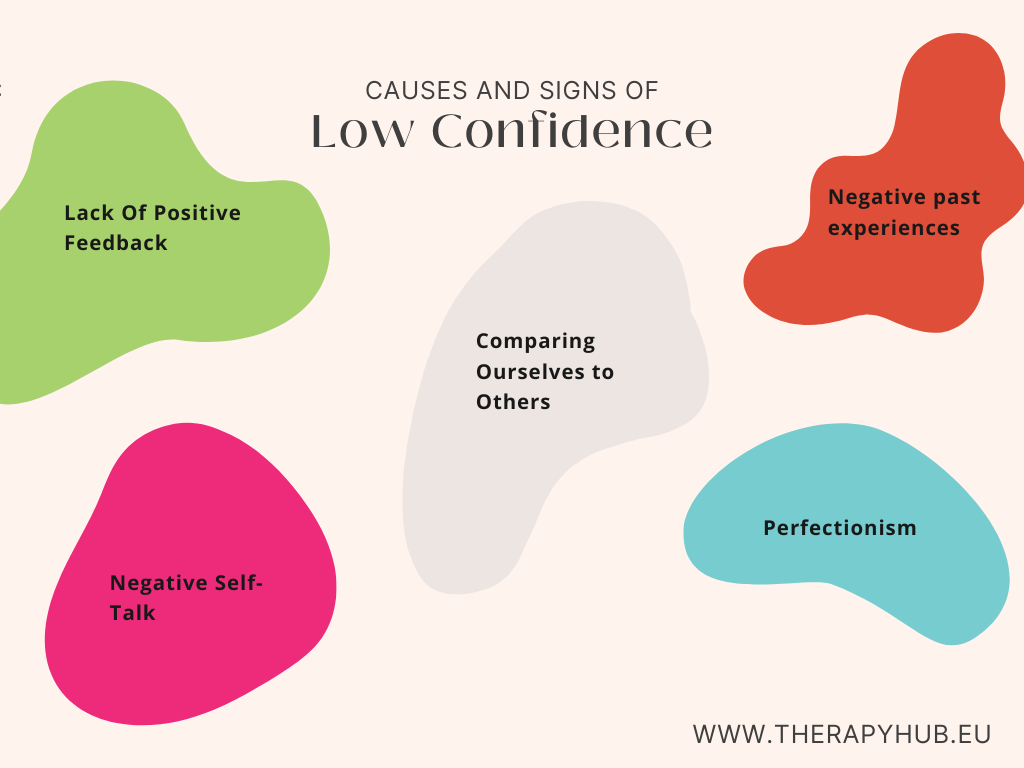
Speaking with confidence is essential for effective communication, whether in personal or professional contexts.
As a therapist who provides online counselling services, I have encountered many clients who struggle with confidence when speaking. It’s a common issue that can cause anxiety, fear, and self-doubt. However, with the right guidance and support, it’s possible to overcome these challenges and build confidence in speaking.
In this article, I will share practical tips and insights that can help you speak with more confidence, drawing from my experience working with clients in online therapy sessions.
By the end of this article, you will have a better understanding of why some people struggle with confidence when speaking and how you can improve your communication skills with the help of online counselling and therapy.
Why Some People Struggle with Confidence When Speaking:

There are many reasons why some people may find it difficult to speak with confidence. These reasons can range from past negative experiences to underlying psychological conditions. Some common factors include:
- Past Negative Experiences: Negative experiences such as criticism, ridicule, or failure can have a lasting impact on our confidence in speaking. We may develop negative beliefs about our abilities, fear being judged or rejected, and become hesitant to speak up.
- Lack of Preparation: Being unprepared can lead to feeling nervous or unsure about what to say, which can contribute to a lack of confidence when speaking.
- Social Anxiety: Social anxiety is a common condition that can impact our ability to speak with confidence in social situations. We may fear being judged or rejected, leading to feelings of self-consciousness and hesitation.
- Lack of Assertiveness: If we struggle with assertiveness, we may find it challenging to express our opinions or needs, leading to a lack of confidence in speaking up.
- Low Self-Esteem: Our level of self-esteem can impact our confidence when speaking. If we have low self-esteem, we may doubt our abilities or feel unworthy of speaking up.
Remember that these factors are common and normal, and that there are ways to overcome them.
Tips for Improving Confidence When Speaking
Speaking with confidence is a skill that can be developed with practice and patience. Here are some tips that can help you build your confidence when speaking:
- Practice and Preparation: Practice is key to building confidence when speaking. Take the time to prepare what you want to say and rehearse it before speaking. This can help you feel more confident and prepared.
- Positive Self-Talk and Visualization: Self-talk and visualization can be powerful tools for building confidence. Use positive affirmations to encourage yourself, and visualize yourself speaking confidently and assertively.
- Breathing Exercises and Relaxation Techniques: Nervousness and anxiety can cause physical symptoms that can interfere with speaking. Try deep breathing exercises and relaxation techniques to calm your nerves and help you feel more relaxed and centred.
- Effective Communication Skills: Effective communication skills, such as active listening, clear and concise speaking, and appropriate body language, can help you feel more confident and in control when speaking.
- Building Self-Esteem Through Online Counselling and Therapy: Low self-esteem can impact our confidence when speaking. Working with an online therapist can help you build your self-esteem and develop a more positive self-image, which can help you feel more confident when communicating with others.
Remember, building confidence when speaking takes time and practice. Be patient with yourself, and don’t be discouraged if you don’t see immediate results. With persistence and determination, you can develop the skills and confidence you need to speak with ease and confidence.
Strategies for Overcoming Fear When Speaking

Fear is a common reason why some people struggle with confidence when speaking. Here are some strategies that can help you overcome fear and build your confidence:
- Identify and Address the Root of Fear: Fear can be rooted in past experiences, negative beliefs, or a lack of confidence. Working with an online therapist can help you identify the root of your fear and develop strategies to overcome it.
- Gradual Exposure to Feared Situations: Gradual exposure to feared situations can help you desensitize to them and build your confidence over time. Start with small, manageable speaking situations and gradually work your way up to more challenging ones.
- Challenge your Inner Voice: Negative self-talk can contribute to fear and anxiety when speaking. Cognitive restructuring involves challenging negative thoughts and replacing them with more positive, constructive ones.
Remember, it’s normal to feel fear and anxiety when speaking, and it’s possible to overcome these challenges with the right support and strategies.
Speaking with Confidence for Introverts

Introverts are individuals who tend to be more inward-focused, introspective, and prefer solitude or smaller social interactions.
Introverts may find it particularly challenging to speak with confidence, especially in social situations. Here are some tips that can help introverts speak with more confidence:
- Embrace Introversion and Leverage Its Strengths: Introverts tend to be great listeners, thoughtful, and introspective. Embracing these strengths can help you feel more confident when speaking.
- Building Confidence Through Preparation and Practice: Preparation and practice can help introverts feel more confident when speaking. Take the time to prepare what you want to say and rehearse it before speaking.
- Importance of Self-Care: Self-care is critical for introverts to recharge and restore their energy. Adopting self-care routines or working with an online therapist can provide valuable support and guidance in developing effective self-care strategies.
Being an introvert is not a disadvantage, but a unique trait that comes with lots of strengths.
With practice and support, introverts can learn to speak with confidence and assertiveness, leveraging their strengths to communicate effectively.
Causes and Signs of Low Self-Confidence

Low self-confidence can impact our ability to speak with confidence and assertiveness. Here are some common causes and signs of low self-confidence:
- Negative Past Experiences: Past experiences of criticism, rejection, or failure can impact our self-confidence and lead to self-doubt.
- Lack of Positive Feedback: A lack of positive feedback or affirmation can contribute to low self-confidence and self-doubt.
- Comparing Ourselves to Others: Comparing ourselves to others can lead to feelings of inadequacy and low self-confidence.
- Perfectionism: Perfectionism can contribute to unrealistic expectations and a fear of failure, leading to low self-confidence.
- Negative Self-Talk: Negative self-talk, such as self-criticism or self-blame, can contribute to low self-confidence.
Some signs of low self-confidence include avoiding social situations, feeling anxious or stressed, negative self-talk, self-doubt, and feeling unworthy or inadequate. Online counselling and therapy can be helpful in addressing the root causes of low self-confidence and developing effective strategies to overcome them.
Ways to Improve Self-Esteem
Improving self-esteem can help boost our confidence and ability to speak with assertiveness. Here are five ways to improve self-esteem:
- Practice Self-Compassion: Self-compassion involves treating yourself with kindness, understanding, and support, just as you would a friend. This can help improve self-esteem and reduce negative self-talk.
- Focus on Your Strengths: Focusing on your strengths can help build confidence and self-esteem. Take time to identify your strengths and celebrate them.
- Set Realistic Goals: Setting realistic goals can help build a sense of accomplishment and improve self-esteem. Break larger goals into smaller, more manageable steps to help achieve them.
- Engage in Self-Care: Engaging in self-care activities, such as exercise, mindfulness, or hobbies, can improve overall well-being and boost self-esteem.
- Seek Support through Online Counselling and Therapy: Working with an online therapist can provide valuable support and guidance in improving self-esteem and developing effective coping strategies.
Remember, improving self-esteem takes time and effort, but it’s possible with the right support and strategies. By developing self-compassion, focusing on strengths, setting realistic goals and engaging in self-care, you can improve your self-esteem and feel more confident when speaking.
The Benefits of Online Counselling and Therapy for Improving Confidence When Speaking
Online counselling and therapy can provide a safe and supportive environment for improving confidence when speaking. Here are some benefits of online counselling and therapy for improving confidence:
- Flexibility and Convenience: Online counselling and therapy can be accessed from the comfort of your own home or wherever you have internet access, providing convenience and flexibility.
- Privacy and Confidentiality: Online counselling and therapy can offer a high degree of privacy and confidentiality, which can be especially important for sensitive issues like confidence when speaking.
- Access to Professional Support: Online counselling and therapy provides access to professional support from trained therapists who can provide effective guidance and strategies for improving confidence when speaking.
- Tailored Support: Online counselling and therapy can be tailored to your specific needs, providing personalized support and strategies for improving confidence when speaking.
By working with an online therapist, you can identify the root causes of your lack of confidence when speaking and develop effective strategies for overcoming these challenges. Whether you struggle with social anxiety, past negative experiences, or low self-esteem, online counselling and therapy can provide the support and guidance you need to improve your confidence and communication skills.
Putting it All Together
Improving confidence when speaking is a skill that can be developed with practice and support.
Whether you struggle with social anxiety, negative past experiences, or low self-esteem, there are effective strategies and support available to help you build your confidence and strengthen your communication skills.
Remember, improving confidence when speaking takes time and effort, but with persistence and support, it’s possible to develop the skills and confidence you need to communicate effectively.
Whether you work with an online therapist, practice speaking with a trusted friend, or try other strategies, the key is to keep practising and never give up.
I hope this article has provided you with valuable insights and strategies for improving your confidence when speaking. If you would like to explore online counselling and therapy as a way to improve your confidence and communication skills further, please don’t hesitate to contact me.


Just what I was searching for, thank you for posting.
Glad it was of some use, Romagno 🙂
Thanks its is very encouraging, because I lack self confidence from childhood till now and because of that, I’m not entitled to anything, Thanks again much appreciated.